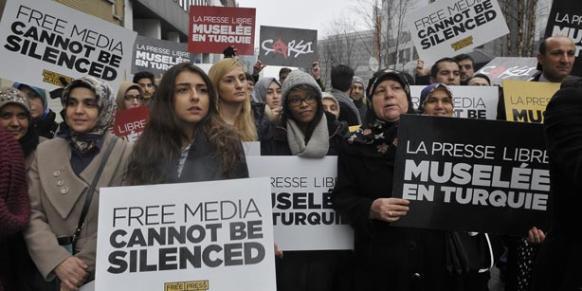The government of Turkey has taken over a popular newspaper, raising fears of more crackdowns on dissent
By Umar Farooq, The Vocativ
An Istanbul court ordered the government takeover of Turkey’s top-selling newspaper Friday, triggering concerns from human rights groups and opposition leaders that freedom of press in the country has all but disappeared.
The newspaper Zaman, and its English-language sister paper Today’s Zaman, were taken over by court administrators, confirmed Managing Editor Celil Sagir. Rumors had circulated in pro-government media for days that the Turkish government was cracking down on dissent. Late Friday, Turkish authorities raided Zaman’s offices and reportedly fired tear gas and water cannons at protesters outside.
“By lashing out and seeking to rein in critical voices, President Erdogan’s government is steamrolling over human rights,” Amnesty International said in a statement.
The court order alleges the newspapers were acting as outlets for Fethullah Gulen, an elderly cleric who lives in exile in the Poconos, and who is being tried in absentia for attempting to overthrow the government. The court also alleges the newspapers support the Kurdistan Workers Party, the PKK, which has waged a three-decade-long insurgency against Ankara for a separate Kurdish homeland. The PKK is designated a terrorist group by Turkey and the United States.
“These are the typical excuses we hear from fascist or authoritarian regimes,” said Sagir. “Labeling us terrorists or traitors working for someone outside the country.”
In addition to targeting critical media outlets directly, President Recep Tayyip Erdogan is accused of using special laws banning “insults” of the presidency to silence critics. There are some 1,845 cases currently pending, including hundreds against journalists.
Gulen, the head of one of Turkey’s largest religious movements, Hizmet, was a close ally of Erdogan and his party, the AKP, until three years ago. Hizmet worked to systematically replace the secular elites in the country’s government and institutions who had imposed severe restrictions on religious practices in Turkey.
With Gulen’s support, in 2002 the AKP was ushered into government, and the party has continued to win elections since, the last in November 2015.
But Gulen and Erdogan publicly fell out in 2013 over allegations of corruption leveled by Zaman and questions about how the country should deal with Israel and whether or not it should get involved in the war in Syria. Erdogan accused Gulen of running a “parallel government” and claimed he was trying to use his followers in the civil service to topple the AKP. Prosecutors declared Hizmet a terrorist organization, triggering a purge of thousands of police, prosecutors, and judges allegedly affiliated with Gulen.
“The takeover of Zaman is a major event,” said Mustafa Akyol, a Turkish columnist. “It was probably the top-selling paper in the country, and one of the oldest.” While many of the paper’s readers are Gulen followers, Akyol said the takeover was part of a larger crackdown on media in Turkey. “This is just another phase in a processes… today you can declare Zaman a terrorist group, and say it is committing treason, and the next day you can do the same to Hurriyet [another leading paper]. The country’s other papers can easily become next.”
Erdogan’s government has already used allegations of affiliation with Gulen to restrict dozens of media outlets.
In 2015, prosecutors ordered the takeover of Koza İpek Holding, a group that owned two major television channels, Bugün TV and Kanaltürk. A dozen other smaller radio and television outlets were also banned last year, and just last month IMCTV was banned after prosecutors accused it of spreading propaganda for the PKK, after the outlet gave extensive coverage to ongoing clashes between the separatist group and the Turkish military in the country’s southeast.
Akyol says previous military governments occasionally ordered the temporary closure of newspapers, but the current take overs are unprecedented. “The government now is taking papers over outright, and the next day, they are transformed into propaganda,” he said. This is something we have never seen before.”
The takeover of Zaman comes as the ruling AKP is at loggerheads with the country’s Constitutional Court, a special body tasked with dealing with violations of constitutional rights. In February, the court ordered the release pending trial of Can Dündar, the editor of leading newspaper Cumhurriyet, along with his colleague Erdem Gül. The pair spent three months in prison awaiting trial for charges of espionage after publishing stories allegedly documenting the shipment of arms to Islamist rebels in Syria. Prosecutors alleged the pair was part of the Gulen network. After their release, Erdogan said their work had “nothing to do with the freedom of the press,” and he would neither “respect” nor “abide” by the court’s ruling.
“Government pundits are now openly saying the Constitutional Court should be abolished,” Akyol said. That kind of rhetoric, he continued, makes it “hard to see any legal authority that will challenge this closure of Zaman. If a court were to reverse this order, it will too become a target of the government’s wrath.”
“It’s time,” he said, “to discuss if Turkey should be classified as a democracy any longer.”



















